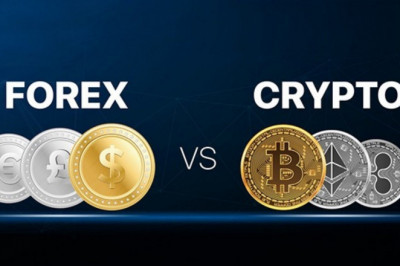views
Hot vs Cold Wallets: Key Differences for Crypto Security
Cryptocurrency is transforming the financial world, providing unparalleled flexibility and security for managing digital assets. However, safeguarding your cryptocurrency requires understanding the different wallet options available. Two primary types of wallets are hot wallets and cold wallets. Both have unique advantages and challenges, making them suitable for different purposes. In this article, we’ll explore these wallets in detail, discuss their key differences, and help you choose the right one to enhance your crypto security.
What Are Hot Wallets?
Hot wallets are digital wallets that remain connected to the internet, making them ideal for quick and frequent access. Whether you're trading, shopping, or transferring funds, hot wallets are designed for ease of use.
Introduction to Hot Wallets
Hot wallets are widely used due to their accessibility and integration with cryptocurrency exchanges and decentralized apps (dApps). These wallets allow you to store private and public keys on internet-connected devices, such as your smartphone or computer.
Examples of Hot Wallets
-
Mobile wallets: Apps like Trust Wallet and MetaMask that run on smartphones.
-
Web wallets: Wallets accessed directly through web browsers, such as Coinbase Wallet.
-
Desktop wallets: Software installed on PCs or laptops, like Exodus or Atomic Wallet.
These wallets are convenient, but their constant internet connectivity makes them vulnerable to cyber threats.
Advantages of Hot Wallets
-
Instant Access: Hot wallets are perfect for those who need frequent access to their funds for trading or spending.
-
User-Friendly: Most hot wallets feature intuitive interfaces that are easy for beginners to navigate.
-
Integration: Many hot wallets integrate seamlessly with cryptocurrency exchanges and dApps.
Disadvantages of Hot Wallets
-
Security Risks: Hot wallets are more susceptible to hacking, phishing, and malware attacks due to their online nature.
-
Dependency on Internet: You need an active internet connection to access your funds.
Example Use Case: Imagine a trader who buys and sells Bitcoin daily. A mobile hot wallet like MetaMask ensures instant transactions, but they must be vigilant about security.
What Are Cold Wallets?
Cold wallets, on the other hand, operate offline, providing an extra layer of security for long-term storage. They are often the preferred choice for those holding large amounts of cryptocurrency.
Introduction to Cold Wallets
Cold wallets store private keys on devices that are not connected to the internet. This offline status protects them from cyberattacks, making them highly secure.
Examples of Cold Wallets
-
Hardware wallets: Physical devices like Ledger Nano X and Trezor.
-
Paper wallets: A printed sheet containing your public and private keys.
These wallets are designed for individuals prioritizing security over accessibility.
Advantages of Cold Wallets
-
Unmatched Security: Being offline, cold wallets are immune to hacking and phishing attempts.
-
Ideal for Long-Term Storage: Perfect for those who don’t need frequent access to their funds.
Disadvantages of Cold Wallets
-
Less Convenient: Accessing funds involves additional steps, such as connecting the hardware wallet to a computer.
-
Physical Risks: If you lose your hardware wallet or paper wallet, recovering your cryptocurrency may be impossible.
Example Use Case: A long-term investor holding Bitcoin for years may prefer a hardware wallet like Ledger Nano X to minimize security risks.
Key Differences Between Hot and Cold Wallets
Understanding the differences between these wallets can help you make informed decisions. Let’s break them down:
Hot wallets are ideal for active trading, while cold wallets excel in securely holding assets for the long term.
How to Choose the Right Wallet
Choosing between a hot and cold wallet depends on your needs and preferences. Consider the following factors:
For Active Traders
If you frequently trade cryptocurrency, a hot wallet is your best option. Its instant access and compatibility with exchanges allow seamless transactions.
For Long-Term Investors
For those holding cryptocurrency as a long-term investment, a cold wallet is the safest choice. The offline nature ensures your assets are protected from cyber threats.
A Balanced Approach
Many users adopt a hybrid strategy by using both types of wallets. For example, they keep small amounts in a hot wallet for daily use while storing the bulk of their assets in a cold wallet for enhanced security.
Exploring Wallet Options
Platforms like CoinW wallet offer a user-friendly and secure way to manage your cryptocurrency. By using both hot and cold storage options, you can maintain the perfect balance between accessibility and security.
Best Practices for Wallet Security
Regardless of your wallet choice, following security best practices is essential to protect your digital assets.
Tips for Hot Wallets
-
Enable two-factor authentication (2FA) for added security.
-
Use strong, unique passwords and change them regularly.
-
Avoid accessing your wallet on public Wi-Fi networks.
Tips for Cold Wallets
-
Create multiple backups of your private keys and store them securely.
-
Keep your hardware wallet in a safe location, away from moisture and heat.
-
Regularly check your wallet to ensure it is functioning correctly.
Conclusion
Choosing between a hot wallet and a cold wallet comes down to your individual needs. Hot wallets are convenient for frequent transactions, while cold wallets provide unmatched security for long-term storage. By understanding their differences and adopting best practices, you can effectively safeguard your cryptocurrency assets.
To secure your crypto today, explore options like CoinW wallet and take control of your digital assets. Whether you’re a trader or an investor, a thoughtful approach to wallet management is the key to staying safe in the cryptocurrency world.











